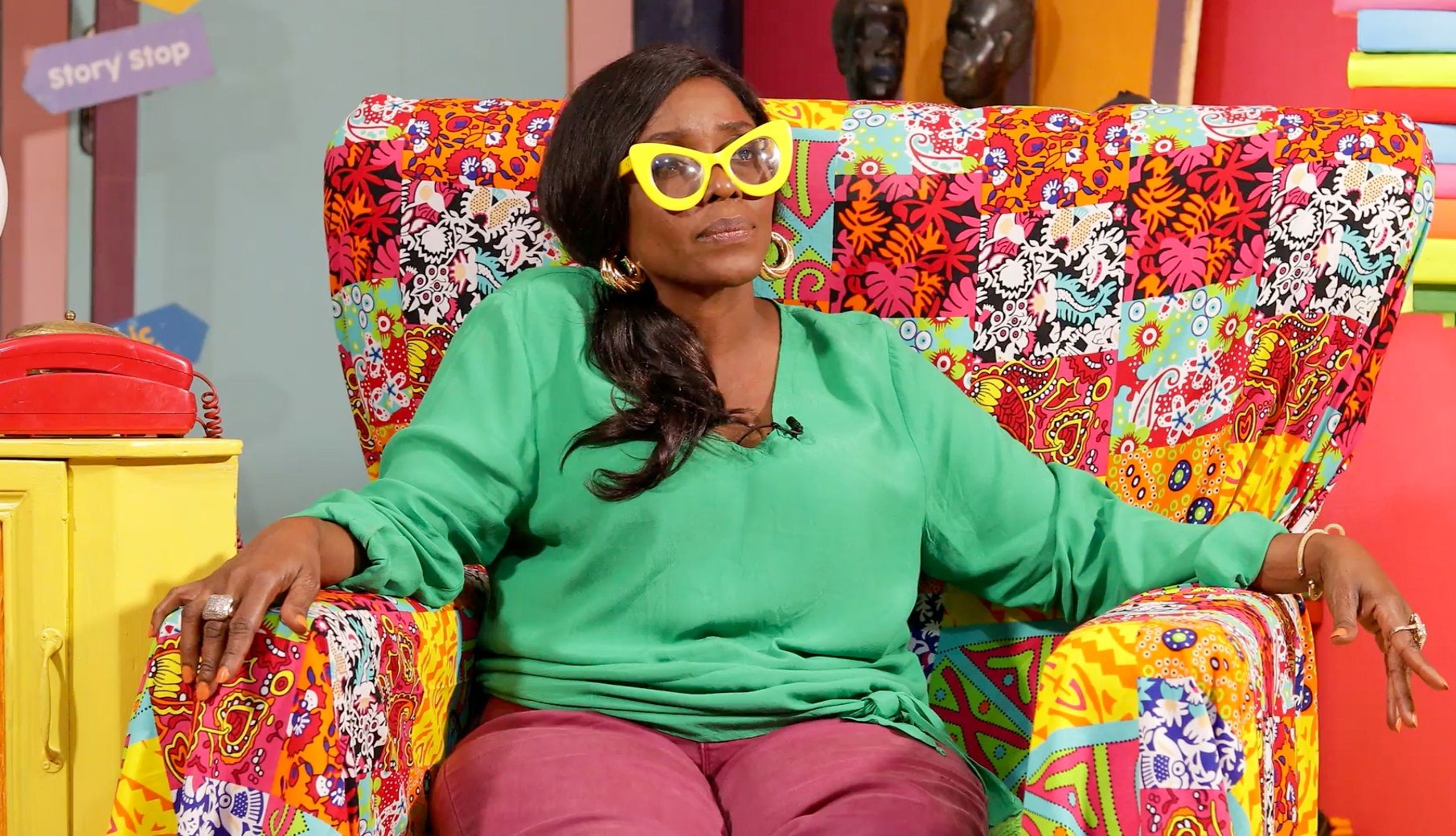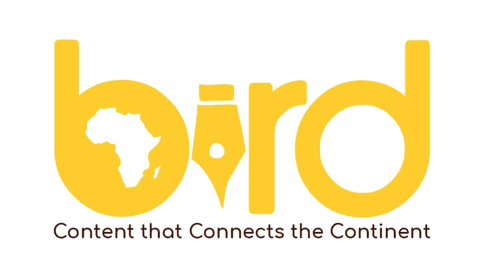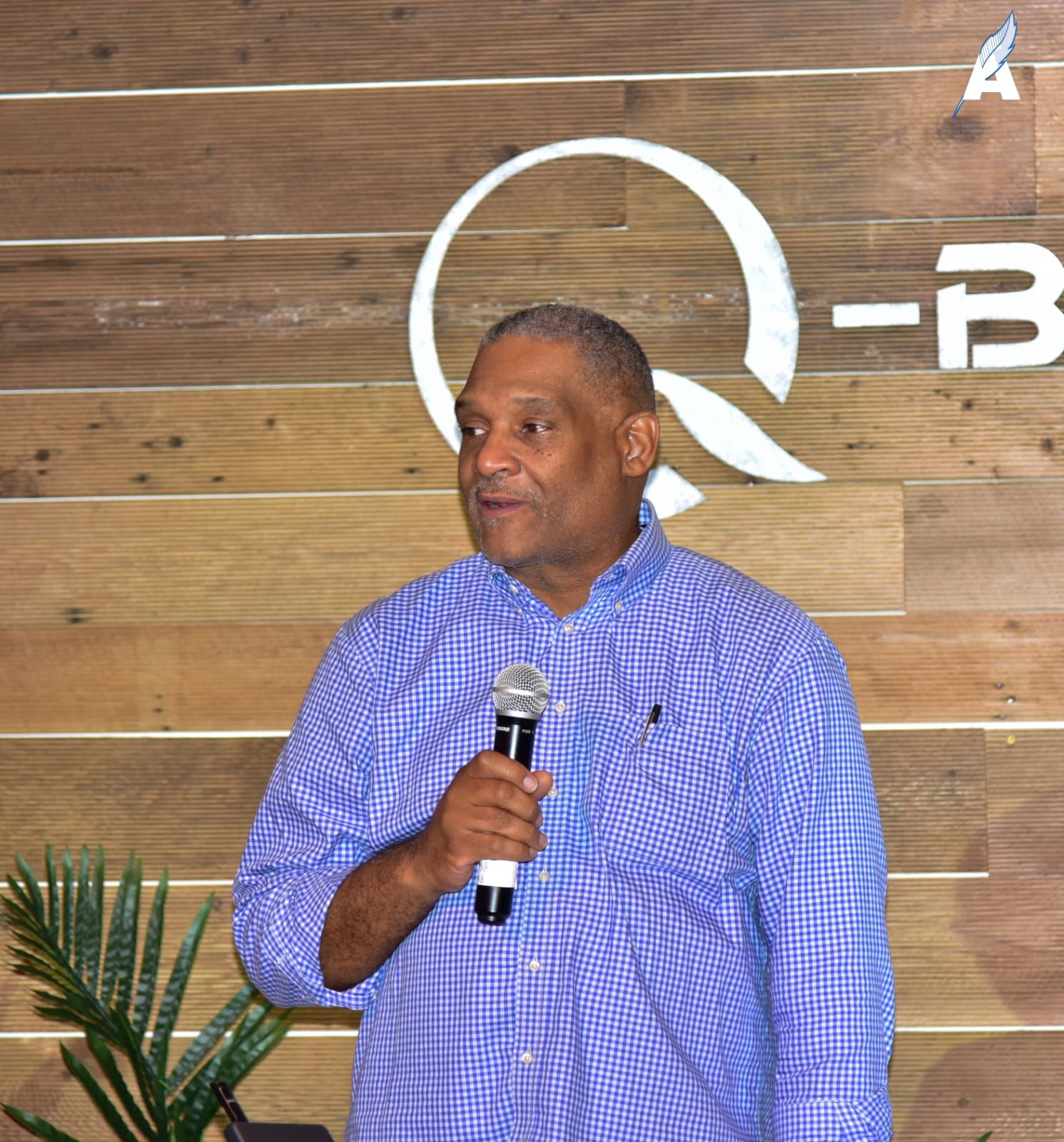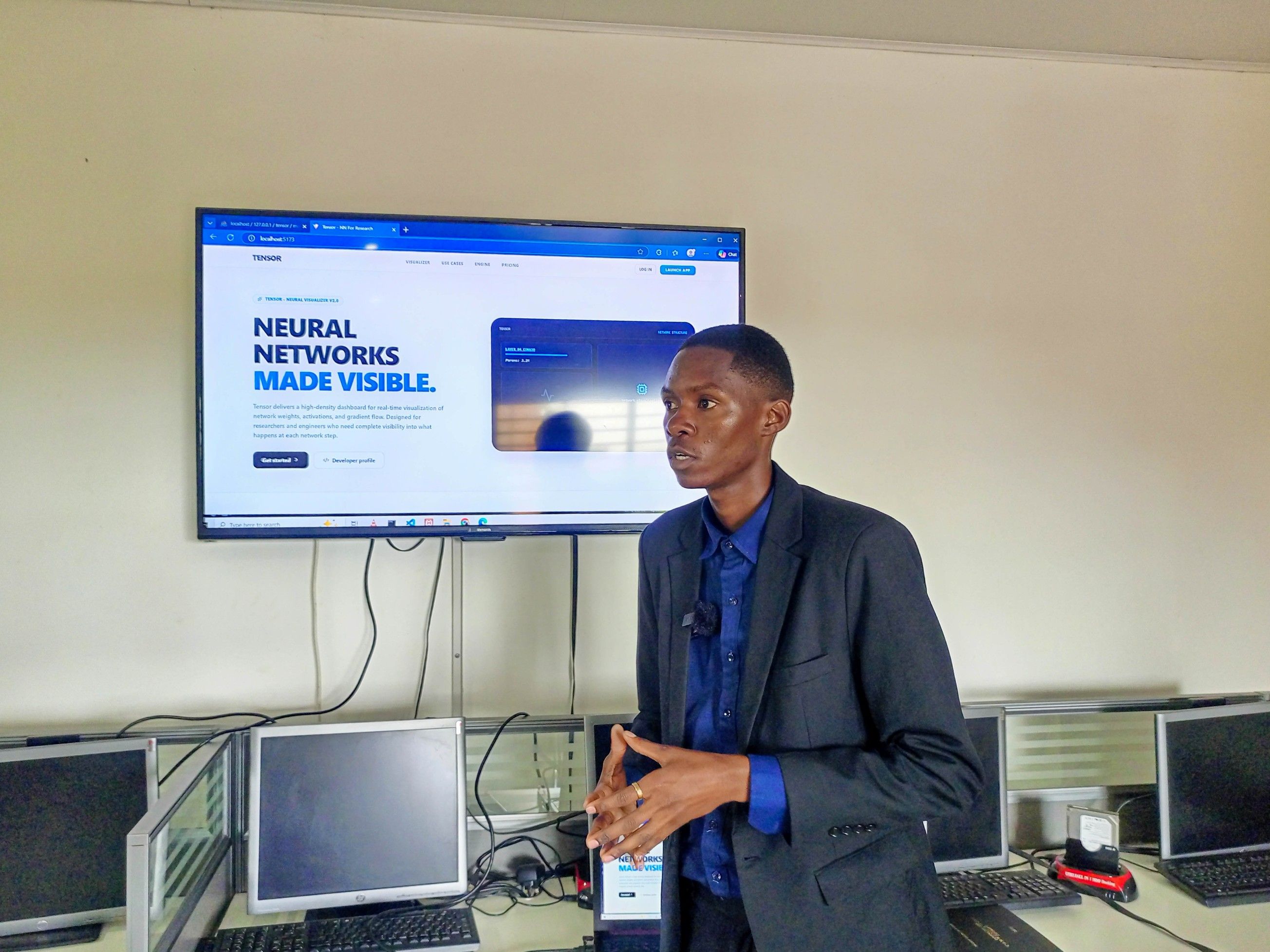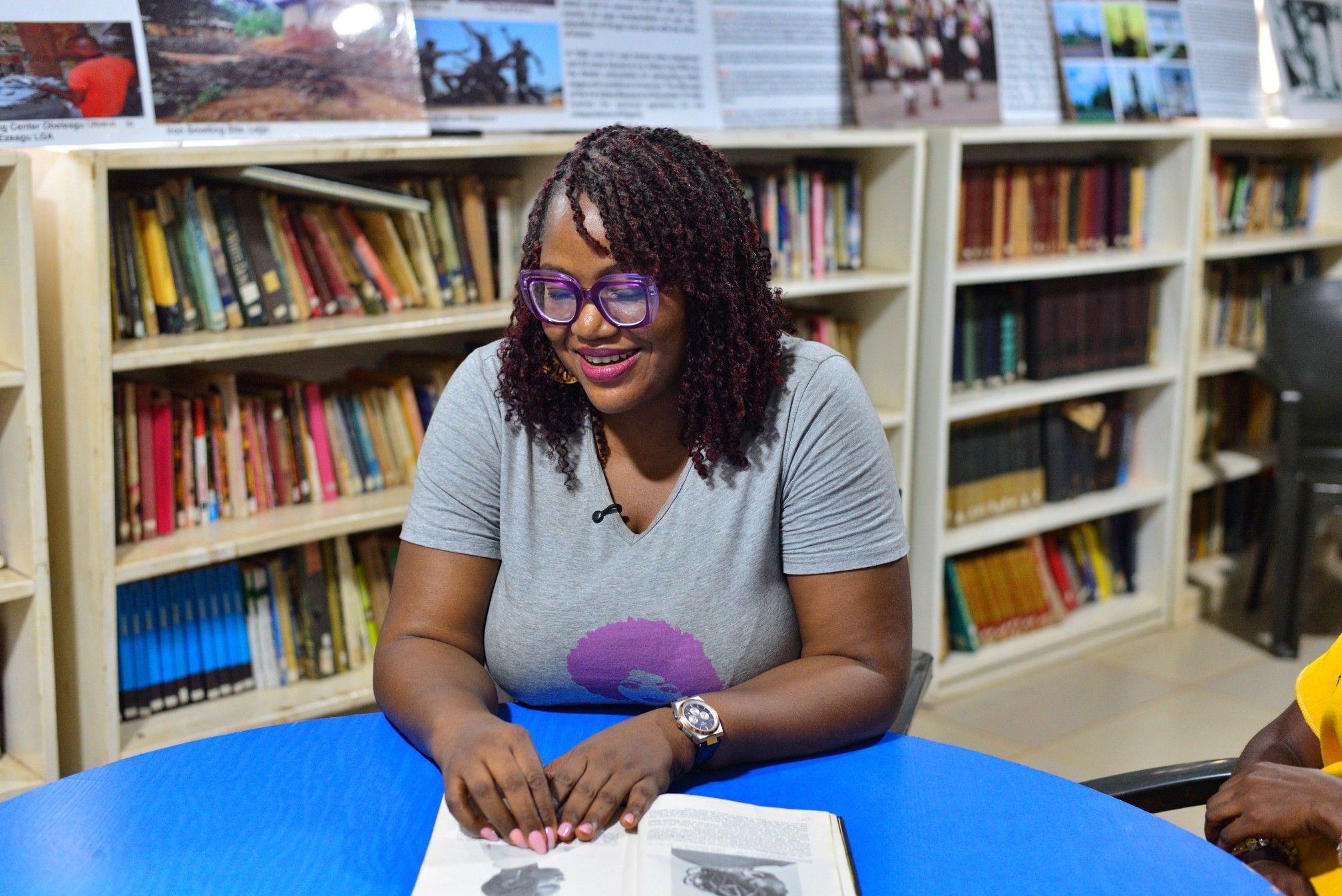The creative force behind a beloved children’s entertainment character is multifaceted artist and entrepreneur Bola Edwards. She has dedicated her talent to crafting engaging and educational content for children with a focus on celebrating African heritage. Edwards is joined by her family on this journey.

Kate Okorie, bird story agency
Bola Edwards' living room has been transformed into a giant stage. Large styrofoam books stand tall while an oversized pencil crafted from plywood balances on a brown wall. The opposite wall is a fuchsia pink. The space looks like a classroom from a child’s whimsical imagination.
In the middle of the room stands an armchair upholstered in the swirling patterns of African textiles. It is here, at the centre of things, that the fictional grandmother character Grandma Wura comes to life, sharing stories with young African minds around the globe.
Ever since the character's debut in 2015, Grandma Wura has been integral to Edwards' work with her company, Proud African Roots.
She founded the creative arts company with her husband, Patrick, in 2013, a year after leaving her corporate job. Their mission was to raise a new generation of African leaders by blending African arts and storytelling with tangible lessons on values and leadership.
Their strategy was multifaceted – leveraging stories, music and drama to educate their young audience.
"Children are much like sponges; they're extremely impressionable. At this age, whatever values you want to instil in them, you just have to put in a story," Edwards explained.
Yet, capturing the children's attention required significant effort.
“Our children are now more Western, and to reach them we have to find a way to bring together Western and African cultures to create relatable content,” she said.
This birthed the grandmother character that embodied this cultural fusion.
“We did a lot of research to craft Grandma Wura's identity,” Edwards said.
"When you see Grandma Wura, you see more than just the Ankara (African textile) and buba (traditional blouse); you're met with an array of colours, beauty, and an exotic allure," she added.
While Edwards was aiming to create a character with a global appeal, like Disney's iconic figures, she did not initially see herself in the role.

"When the character was first conceived, it seemed so big and I began searching for someone who could truly personify her," she said.
However, she struggled to find someone willing to dedicate the necessary time to portray the character. So she committed to voice training and began studying elderly women.
Grandma Wura was unveiled during the company's school tour, where she told stories to children and offered leadership training during their assembly time, reaching over 22,000 school children.
The project expanded into theatre productions, where entire families could experience the stories in an engaging and communal setting. Promoted as “Story Theatre with Grandma Wura”, the production became an annual Children's Day event.
“The concept was to get children to come and see the stories come alive on stage, like you would in the King and I Broadway musical,” Edwards said.
In addition to the school tours, she shared that the shows included a capacity-building programme, training approximately 600 children.
"Story Theatre with Grandma Wura has evolved in many ways," Edwards noted.
"We had individuals sponsoring orphanages and students to see our shows. There were also schools and parents who bought their tickets themselves," she explained.
The onset of the COVID-19 pandemic compelled Edwards and her team to pivot towards television and other digital platforms to retain their audience. Consequently, they launched two television shows: Grandma Wura School Bus and Grandma Wura Story Hut.
The School Bus is an entertaining educational series that introduces children to new vocabulary, values and African proverbs. In contrast, Story Hut is reminiscent of African folktales, although Edwards’ stories were original and largely created in-house. So far, she has completed two seasons for each show.
The stories are packed with lessons, employing repetition and songs for reinforcement.
“At the end of each story, there's a recap. Some stories have even been transformed into books available on Amazon,” Edwards shared.
Grandma Wura's shows, beyond imparting moral lessons, often acquaint children with the diverse languages and cultures of Nigeria's ethnic groups and those of other African countries.
“I Wish I Wish,” a story about self-love and hard work, featured a protagonist and expressions from the Igbo tribe, which, along with Hausa and Yoruba – Edwards' native tribe – is one of Nigeria's three largest ethnic groups.
Before her content went on television, Edwards released it on the company’s YouTube channel, where, to her surprise, it garnered an audience that included children and families from the African diaspora.
Her partnership with television stations resulted in Grandma Wura's content being broadcast on several local stations and regional satellite provider DSTV, expanding its reach across Nigeria and including Ghana, Uganda, Gambia and even audiences in the US and the UK, through NTA International.
Initially, Edwards faced challenges with television companies because they favour foreign programming. When they did agree to air Grandma Wura's content, it was without compensation.

A 2021 UNESCO report shows that while local television series in countries like Nigeria and Côte d’Ivoire have increased, intra-regional co-productions in Africa are still rare. In contrast, there are often stronger collaborations between some African countries and Europe, driven by subsidies from the latter.
"Most of what we, as Africans, provide for our children is Western content. Children need to see themselves reflected in the content they consume, and that's why we do what we do," Edwards said.
Not just the stories, but the soundtracks in Grandma Wura’s shows are original.
"Our songs have a mix of African languages and English," she explained.
In one of the rooms of her house, she set up a studio where Patrick and their 17-year-old son, David, spend most of their time during peak production periods.
"Introducing an African element is a must when we compose a song," Patrick said.
“David and I collaborate [in the studio]. He is the younger version [of me] and connects with the youth, so there is a perfect blend of the old and the new," he added.
David was not always interested in the production process.
"I kind of found my path after awakening ... it’s somewhat like a journey of discovering myself within our African culture through arts, music, and everything creative," David explained.
Just a few months ago, he was a core part of the production team for the nine-episode climate change podcast series, "Green Tales of Singing Trees".

Much like the Grandma Wura character, the podcast's central figure, Singing Tree, was unusual but charming.
"It was delightful to see how much the children and their families loved her," Bola Edwards remarked.
During production, Edwards and her team grappled with the challenge of discussing a complex subject like climate change, especially considering the wide variance in climate change literacy rates across Nigeria.
To navigate this hurdle, she made sure the team was thoroughly engaged.
“One of the things that we did with the podcast, besides using a video teaser, was to use lots of sound effects to colour the story and take the listener on a journey,” Edwards said.
“In my experience, utilising audiovisual learning has proven to be the most effective means of conveying information to children,” explained Ogunsola Ayooluwa, the vice president of Eco Diversified International who has spent the past two years educating young people about the environment and climate change.
Ayooluwa pointed out that the lack of climate change topics in school curricula and the scarcity of educational materials are barriers to raising awareness among young people.
Edwards' living room is now being overhauled for the third season of the "Grandma Wura School Bus" show. She has done this for every new season to ensure a fresh look while keeping its appeal to her young audience.
“The future of African traditional storytelling is humongous,” Edwards said, referencing Iwájú, the Nigerian animated series selected to stream on Disney+ before turning to the topic of Afrobeats, the sound that has gripped global audiences.
"Do you see how the whole world has gravitated towards the music genre?"
Edwards stressed the importance of self-validation; the need for Africans to celebrate their cultural assets without waiting for external approval.
"We should promote what we have," she said.
In their home studio, David begins playing the hand drum. He taps the taut animal skin cover of the drum, gradually increasing the intensity. The sound from the hollow instrument reverberates through the home, grabbing everyone’s attention.
“He is in his element,” said Edwards.
bird story agency

